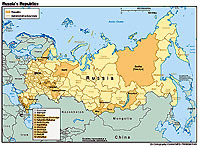Investment Standards Face Hurdles

(Moscow Times – themoscowtimes.com – Peter Hobson – July 22, 2013) The Russian government faces an uphill struggle to make underdeveloped regions more attractive for investors.
Officials and business leaders disagree on the feasibility of a draft set of mandatory standards designed to improve the investment attractiveness of districts and towns, which are set to enter into force by 2014.
The 27-page “Standards for Local Self-Governing Authorities for the Provision of a Favorable Investment Climate,” was discussed at a local self-governance forum in Volgograd last week the latest in a series of discussions of the document, developed at the request of President Vladimir Putin last December. The standards are due to be presented to the Cabinet later this year for approval and nationwide implementation from 2014.
Local budget shortfalls, underdeveloped economic sectors, a lack of adequate personnel, poor infrastructure, a deficit of banking services and low internet penetration are all hindering investment, said the All-Russian Council of Local Self-Governance an organization set up by United Russia in 2006 that co-wrote the document in a statement released after the forum.
The proposed solution is a set of formal standards directing the country’s 23,001 municipalities to set priorities, predict problems, target weak sectors of the economy, provide services and resources, improve personnel competence, direct education to the needs of the economy, assess competitiveness and methods of financing and guarantee active assistance to investors.
Many municipalities are indeed failing to attract investment, Tomsk Mayor Nikolai Nikolaichuk told The Moscow Times, but this is because administrators lack the necessary skill set and incentives.
“We need to teach, to inspire, to help,” he said.
Fostering entrepreneurial spirit should be the goal, Nikolaichuk said. “The results of business should stay in the municipality … if even a part of tax income and social benefits are siphoned off to regional administrations, as they are now, action is discouraged,” he said. If the benefits stay in the community, it will provide self-confidence, and positive change.
If the new standards come only in the form of requirements, bureaucracy will be the result, Nikolaichuk said, as municipal authorities will simply spend time filing paperwork. A strategy is needed not just for box ticking, but for encouraging action, he added.
Igor Kokin, a member of the European club of local self-government experts, told Kommersant that it was a fantasy to try to apply the standards throughout the country. “You can count on your hands the cities in which this project is realizable,” he added.
Alexander Galushka, co-president of business lobby group Delovaya Rossia, which was involved in their creation, disagreed. “These standards are based on real working practices,” he said. “In the view of business, their implementation will be a huge benefit in developing the economy.”
Under the standards, information about investment must be comprehensive, annually updated, and communicated via a mandatory dual language Russian and English website.
This site must contain an “investor’s cost calculator,” which will enable business people to understand the cost of municipal services necessary for any given project.
A “one-stop-shopping” approach will be obligatory, so investors can go to a single place to get services, access information and solve problems. An investor’s hotline providing direct communication to municipal leaders will also be required.
